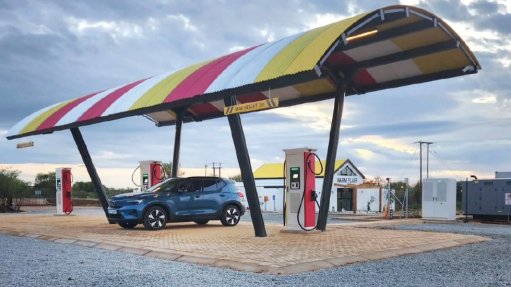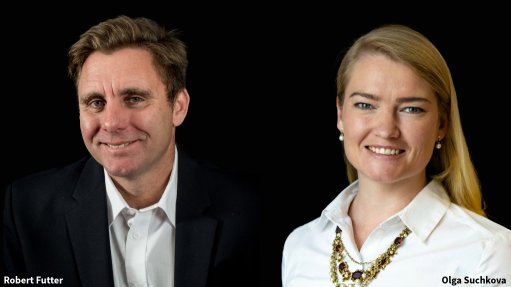AVEVA pursuing hybrid systems for increased productivity
To continuously improve its service offering and align with customer needs, software solutions giant AVEVA says it is going increasingly “hybrid” across the board with its services, meaning capabilities of both on-premise and cloud-based systems are being extended.
The company’s main goal is to reduce the amount of time spent finding data or coming to actionable insights, since organisations increasingly have to improve on their speed of operation, transformation and decarbonisation to remain competitive.
Organisations also need to reduce the amount of time spent to adapt and respond to changing global conditions, such as health pandemics, climate change and events that disrupt global supply chains, as witnessed in recent years.
While some industrial businesses have been reluctant to move to the cloud owing to perceived availability concerns, many are now embracing hybrid architectures where they can benefit from software-as-a-service solutions in a secure cloud, through a central industrial cloud-based platform, AVEVA digital portfolio strategy director Tim Sowell has noted.
On the sidelines of the X-Change 2023 conference, which was held in the Drakensberg from June 4 to 7, Sowell told Engineering News that the benefits of this cloud approach were increased visibility, rapid deployment, stronger security, remote connectivity, cost-effectiveness, streamlined process management and scalability.
He pointed out that industrial plants produced massive amount of real-time data that became useless without it being contextualised and interpreted. A hybrid approach – connecting on-premises systems and data to the cloud – was an attractive strategy for organisations moving to the cloud.
Sowell cited an example whereby an Australian mining company adopted a hybrid approach to remotely monitor the performance of its plants, machinery and vehicles. The company implemented Internet of Things sensors to collect and aggregate large volumes of operational data, taking it from the edge and feeding it into the cloud for analysis to remotely monitor performance.
Through this work, the company could identify problems with machinery and significantly improve its productivity. It could also identify supply chain bottlenecks and remedy the issues.
Combining operational data, production data, three-dimensional models, and engineering and asset information gives virtual competency teams the information they need remotely so businesses can make faster, better-informed decisions, and spot previously hidden opportunities to improve margins.
Sowell said AVEVA software fostered an environment that allowed users to take three or four applications, put them together, and build trusted cloud-based solutions that extended their on-premises board.
He does not believe, however, that the industrial world will ever only use the cloud, but it is becoming a more widespread option.
AVEVA product manager Ernst van Wyk added that searching for information often took a lot of time for customers, hence the rationale for a system that converged and contextualised data and that was accessible from anywhere.
He mentioned that AVEVA had been working on refining its Development Studio, which served as a landing page similar to that of Microsoft Office 365, where the desired services coukd be viewed and selected from one platform. Other recent changes to the Development Studio included the ability to process third-party pieces of software and allowing it to be modified.
He explained that customers needed to be able to work fully remotely, as many experts were based off-site and, in some instances, never visited the plant they were designing, optimising or operating.
Responding to how AVEVA decided on the appropriate product for a customer, given the group’s 140-odd suite of products, AVEVA sub-Saharan Africa sales manager Hanno van Niekerk said AVEVA aimed to understand every customer’s needs and compare it with what similar organisations had found useful.
AVEVA’s Solution Framework maps all its different products against commonalities of challenges that customers regularly face.
Van Niekerk said AVEVA was continuously updating its refence architecture.
LOCAL MARKET
Commenting on the uptake of AVEVA’s solutions and software solutions overall in South Africa, compared with the rest of the world, Sowell said South Africa had always been a leading adopter of technologies, with many software solutions having been trialled and tested in South Africa before any other market globally.
A common misconception, Sowell stated, is that South Africa is always working to “catch up” to the US or UK, for example, when, in fact, it is ahead of these countries in many respects.
Sowell, Van Wyk and Van Niekerk agreed that South African organisations were generally eager to try new technology, whereas the UK prefered mature technologies that had been proven over periods of time, which often led to organisations in that country being late adopters.
Sowell himself is undertaking what AVEVA calls “lighthouses” and “experimentations” with solutions that will not be done anywhere else in the world.
Van Wyk added that South African businesses also tended to test the limits of what software could do, and came up with completely new applications, which AVEVA could add to the listed capabilities of the software.
Van Niekerk believes that part of the business resilience culture in South Africa is the willingness to try new technologies and “take the chance” to see what is possible.
Comments
Press Office
Announcements
What's On
Subscribe to improve your user experience...
Option 1 (equivalent of R125 a month):
Receive a weekly copy of Creamer Media's Engineering News & Mining Weekly magazine
(print copy for those in South Africa and e-magazine for those outside of South Africa)
Receive daily email newsletters
Access to full search results
Access archive of magazine back copies
Access to Projects in Progress
Access to ONE Research Report of your choice in PDF format
Option 2 (equivalent of R375 a month):
All benefits from Option 1
PLUS
Access to Creamer Media's Research Channel Africa for ALL Research Reports, in PDF format, on various industrial and mining sectors
including Electricity; Water; Energy Transition; Hydrogen; Roads, Rail and Ports; Coal; Gold; Platinum; Battery Metals; etc.
Already a subscriber?
Forgotten your password?
Receive weekly copy of Creamer Media's Engineering News & Mining Weekly magazine (print copy for those in South Africa and e-magazine for those outside of South Africa)
➕
Recieve daily email newsletters
➕
Access to full search results
➕
Access archive of magazine back copies
➕
Access to Projects in Progress
➕
Access to ONE Research Report of your choice in PDF format
RESEARCH CHANNEL AFRICA
R4500 (equivalent of R375 a month)
SUBSCRIBEAll benefits from Option 1
➕
Access to Creamer Media's Research Channel Africa for ALL Research Reports on various industrial and mining sectors, in PDF format, including on:
Electricity
➕
Water
➕
Energy Transition
➕
Hydrogen
➕
Roads, Rail and Ports
➕
Coal
➕
Gold
➕
Platinum
➕
Battery Metals
➕
etc.
Receive all benefits from Option 1 or Option 2 delivered to numerous people at your company
➕
Multiple User names and Passwords for simultaneous log-ins
➕
Intranet integration access to all in your organisation

















